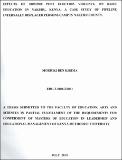| dc.description.abstract | This study sought to investigate the effects of 2007/2008 Post Election violence on basic education in Nakuru Kenya using a Case Study of Pipeline Internally Displaced Persons Camp in Nakuru County. The research was guided by the following research objectives: To evaluate the effects of 2007/2008 Post-Election Violence on basic education in Pipeline Internally Displaced Persons camp in Nakuru County, Kenya; to examine the measures put in place by the Ministry of Education to facilitate access to basic education for internally displaced persons at Pipeline Internally Displaced Camp, Nakuru County; to establish the effectiveness of the measures put in place by the Ministry of Education to facilitate continuity of basic education for the Internally Displaced Persons at Pipeline camp, Nakuru, Kenya. Humanistic theory of motivation guided the study. The study adopted a descriptive survey design. The sample comprised of 140 respondents drawn from a target population of 449 persons comprising of the parents from pipeline internally displaced camp, head teachers, teachers and students from schools adjacent to the Pipeline IDP Camp, Nakuru County. Questionnaires and focused group discussion guides were used in data collection. The validity was enhanced through questionnaires and reliability was enhanced through pilot study which was done at Nairobi road school along Nakuru-Nairobi highway targeting a population of 136 respondents and a sample size of 43 respondents. Data was analyzed using Statistical Package for Social Sciences. From the findings, the study established that the 2007/2008 PEV resulted to inadequate School Infrastructure, inadequate basic needs, inadequate educational facilities and also psychological torture. On the direct effects of the PEV, 34% of the respondents reported to be inadequate food, 33% reported inadequate shelter, 25% reported clothing and 8% were undecided. Majority of the respondents reported that students compete on scarce resources as result of 2007/2008 PEV. On the effectiveness of the measures to facilitate access to basic education, the government was not committed on psychological support towards the PEV affected teachers and students and was uncommitted on financial support to the affected teachers after the 2007/2008 PEV. On the measures put in place, it was reported that the Ministry of education had put in place the supportive program that ensured that those affected during post-election enjoyed their basic need of education by having school feeding program in place and the repair of infrastructure and resources damaged by PEV. The study concluded that the government had committed itself on reforms mechanism towards improvement of basic education but only on school feeding program and the repair of school infrastructure damaged during PEV. The government was not committal on financial and psychological support towards the teachers and students affected by the PEV. The students had to compete for scarce resources as result of 2007/2008 PEV. The study made the following recommendations: the school committees and board of management should comprise of different ethnic members for ethnic balance; Government should keep check on Peace Education in the curriculum; the national treasury budget to allocate more funds towards PEV victims education; there should be more provision of basic needs and other critical services like medical support. | en_US |

